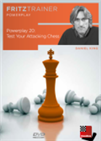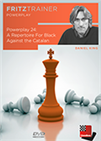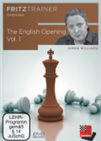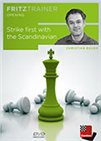Master level blitz
Last month, at a local restaurant in Duluth, Georgia, two masters challenged each other to a 12-game blitz match for the title of 'King of the Kebab'! When two National Masters cross swords the air electrifies and the fight is to the final clock press.
David Mbonu [pictured before the beginning of the match] became a NM (in the USA that means reaching a 2200 USCF rating) in May 2017. His long time-control rating now is 2166, while at blitz he's rated 2054.

Shanmukha Meruga became an NM in July 2016. His rating for long time controls is 2305, and his blitz rating 2183. If one were to make a prediction based on the rating alone, clearly Meruga should be the winner.
Mbonu describes himself as the most aggressive (on the board) National Master in the state of Georgia. And he also teaches this berserk attacking style to his students.
I got a text message on a beautiful Saturday afternoon. That morning I'd gone for a run in the park, in order to prepare myself physically for the future match I'll play in December — a brutal affair comprised of six long time-control games, and ten blitz games played over Saturday and Sunday.
Shanmukha Meruga asked me if I was interested in recording a blitz match against another Master-level player. I decided to do it because I knew both players are dedicated and passionate about the game and I would witness a unique show.
We are now in the habit of often watching these matches at GM-level online, but the online experience cannot compare to a real game over the board. Let me tell you why.
First of all: the pieces. I have a good collection of chess sets and boards, and for this match, I lent one of my sets, called Fierce Knight, valued around USD $250, and wood board (around $100). I believe playing on wood pieces, especially some nice ones, can enhance the chess experience.

Those are some fierce knights!
Then, of course, there are other factors. When playing blitz over the board one cannot pre-move, like with online games. One cannot place a piece precisely at the intersection of three different squares (yeah the squares are 2½ inches and they can still put it in the middle of three different squares, not enough space for their pieces to actually place it in the centre of a square), begging the question as to which one it is exactly a few moves later, when nobody remembers.
Another factor is the adrenaline rush when there are only 20 seconds left and one could have a material advantage, yet be unable to physically move fast enough and hit the clock. And then there are the illegal moves, which terminate a game immediately! Yes, in blitz chess if one leaves the king in check, the opponent can take it and win the game. This doesn't happen online, because the software doesn't allow it. But what about promotion? Online, I choose to automatically promote to a queen, in real chess one must get to the queen, and in time scramble could have problems in placing it over the board. Again, this is one reason why I consider OTB chess more of a sport. While online chess is good enough to practice some openings, it's not quite the same level of intensity, in my view.
Before the match, I thought Meruga would win easily. He is a smart guy, quite passionate about chess, and generally keen to play as often as he can. Considering his priority is not chess but medical school and biochemistry, nowadays he cannot play chess as often as he did when he was in high school.

NM Mbonu on the left, NM Meruga on the right
Mbonu also had to give up part of the chess activity to finish his own degree. While other kids wanted to be firemen or astronauts when they grew up, Mbonu wanted to become a sophisticated electrical engineer. (If he was living in the former Soviet Union, he could have been working with Botvinnik and do both!) In any case, I thought Mbonu was rustier than Meruga, so I believed the match would be a one-sided story with Meruga winning 9 to 3.
Instead, the match was bitterly fought till the last pawn in the last game! The final result was a 6½ to 5½ win for Mbonu!
By the end, I felt the disappointment of Meruga for failing to win, I couldn't stop feeling a sense of elation for having witnessed an amazing match, worthy of those boxing matches of the past with Muhammad Ali and Joe Frazier, or other champions.
I'd like to share the games, with my own annotations. Please pay attention to the variety of openings they used to probe each other, and discover in which one there was a weakness. The endgames are quite interesting because most of the rook manoeuvers were played with only a few seconds on the clock, showing a big difference between a master player and the club player in the quality of the endgames.

Parnell Watkins was the Tournament Director officiating the match
And then, of course, there is the USCF rules component — quite worthwhile in my opinion. Today many tournaments are played over the year, and many young players are unclear on the rules.
In game 6 you'll witness a mess caused by White knocking over some pieces, and putting them back incorrectly over and over. The blitz rules, using the US Chess Federation's book, 6th edition, at page 311 rule 7d, defines the win as:
"Who, after an illegal move is completed by the opponent, takes the king, (if the king is in check) or claims the win and stops the clock, before the player determines a move and provided the player has sufficient mating material as defined in rule 7c."
When there were a few minutes break during games, I used them to gain some improvement tips like the following:
Davide Nastasio: NM Meruga could you give our readers a tip on how to become better players?
Shanmukha Meruga: Don't worry about your rating! You should never worry about your rating, just focus on your moves!
And then I asked the winner of the match:
Davide Nastasio: Can you give a tip to our readers, to tell them how you became so strong?
Mbonu David: Play a lot! A lot of tournament games, and a lot of online games against stronger opponents.

I grouped the first four games together because they were clearly a warm-up to the dazzling action and battle which came later. From game five, each game has some critical positions as exercises.
 Grandmaster Daniel King presents ten exemplary attacking performances. At key moments he stops and asks you to play a move. King then gives feedback on the most plausible continuations. It’s the next best thing to having your own personal trainer!
Grandmaster Daniel King presents ten exemplary attacking performances. At key moments he stops and asks you to play a move. King then gives feedback on the most plausible continuations. It’s the next best thing to having your own personal trainer!Game 5: you are Black, would you sac the knight on g3? Try against the engine, and then see how the game went!
Here is Game 5:
 On this DVD Grandmaster Daniel King offers you a repertoire for Black against the Catalan, based around maintaining the rock of a pawn on d5. Keeping central control ultimately gives Black good chances to launch an attack against the enemy king.
On this DVD Grandmaster Daniel King offers you a repertoire for Black against the Catalan, based around maintaining the rock of a pawn on d5. Keeping central control ultimately gives Black good chances to launch an attack against the enemy king.Game 6: one needs to watch this game to better understand the blitz rules! It is also important to better understand what a match is. When one is playing a match, there is a constant testing the opponent not only in opening theory and preparation but also on the type of positions he likes or dislikes. In this game, Meruga tested Mbonu on closed positions.
We must always be aware of possible tactics in the opening. Black played 14...Nc7 a blunder, how would you continue as White?
White is winning but just blundered with 57.Kd1. It is always important to keep our minds alert to possible drawing chances, so try to find the continuation which helps Black to draw:
Here's the entire game, so by reading the annotations you can see if you got the above exercises right!
 Williams main teaching method behind this set of two DVDs is to teach you some simple yet effective set ups, without the need to rely on memorising numerous complicated variations.
Williams main teaching method behind this set of two DVDs is to teach you some simple yet effective set ups, without the need to rely on memorising numerous complicated variations.Game 7: This game is important for learning discovery tactics.
Black just played 22...Qc3; a blunder, but how to take advantage of it?
Here the entire game with the comments:
 The Scandinavian is a rarely employed opening on the hightest level und guides your opponent on much less familiar terrain than for example the Sicilian, French or any 1.e4 e5 system. After 1.e4 d5 Black fights for the initiative from move one.
The Scandinavian is a rarely employed opening on the hightest level und guides your opponent on much less familiar terrain than for example the Sicilian, French or any 1.e4 e5 system. After 1.e4 d5 Black fights for the initiative from move one.Game 8: This is the real deal. In today's chess world a warrior must be always ready to fight! Meruga switches to 1.e4 to keep his opponent on his toes while probing the enemy preparation.
Black just played 15...Qc5 which is a blunder, however, one must feel out the combination which will give a better position and some material advantage. Take your time and then play it against the engine:
Then there are also important rook endgames one should know how to play. Here White played 48.Rxf7. How should Black continue? In the game, Black blundered but, if one finds the right continuation, it is a draw!
This game was really instructive for the endgame. Don't miss the annotations.
Volume one of the DVD deals with 9.Bc4, White's sharpest option, and shows how Black can counter this ambitious try by White with the main lines of the Soltis variation (12.h5), which was played by Magnus Carlsen regularly as well.
Game 9: Meruga definitely felt the Scandinavian failed him, so he switched to the Sicilian.
Before going to Game 10, we need to understand the situation in the match. Meruga has 5½ points. If he just wins one more game he has won the match. If he draws, Mbonu still has a chance. From the outside, both players were cool and didn't show signs of nervousness which would betray their real feelings.
Game 10 was interesting for how, in a blitz game, the evaluation can change. For example, Black has just played 51...Rgg8, a big mistake. Can you win against the engine?
Another exercise: After 56...Kd7, do you see the checkmate in two?
Here is game 10 with all commentary:
Game 11: I found many positions inside this match to be highly instructive. For example, here Black has a decisive advantage, but only 2 minutes and 49 seconds left. Try to play it against the engine, and see if you can win within that time:
And, see the game for the full picture of how it went:
Game 12: This is the game which decided the match. And I'd like to outline some points, because in my opinion, they prove OTB chess is, in some sense, superior to online chess. Around move 29, Black had the kill shot, but for a moment, maybe due to tiredness, he saw a ghost, an illusion of something he thought White could do. It happens. These kinds of mirages appear at the board. But what is the difference between OTB and online? He already touched the bishop on b7, so that is the piece he must move. Online he would have put the piece down, and nobody would have noticed, but once he touched the piece, his mind was divided upon: "Oh wait, maybe I don't want to take on g2, but I cannot move the rook, or another piece because I touched the bishop", so he kept the bishop lingering in the air...
Another important point is to be able to convert a win, once one has a good material advantage. Try to play against the engine as Black and win! (Hint: the best continuation is Nc5!)
Here is the final game which, again, decided the match!

With the champ — David Mbonu — and Davide Nastasio!
Final thoughts
Often they tell us it is useless to analyse blitz games. What foolishness! Thanks to this article we have learned common tactical motifs, ways strong players activates their rooks in the endgame, play on the seventh rank, checkmate threats/patterns, and so on. We even learned the width of the opening repertoire a master level player has! Now it is up to us to incorporate this wealth of information and improve our own games. My main point was to share the excitement for a match which filled two hours of my life with excitement and wonder.
Links
























